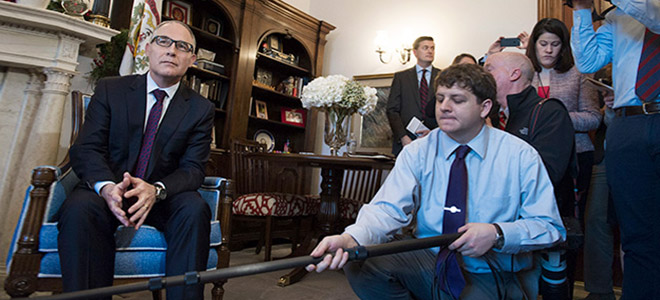
Climatewire
March 19, 2018
by Niina Heikkinen
U.S. EPA boss Scott Pruitt is skilled at sticking to his talking points, particularly when it comes to climate change.
For journalists covering that issue, pushing Pruitt beyond his rhetoric has become more important as the EPA chief has become one of the Trump administration’s highest-profile officials casting doubt on mainstream climate science.
Over a year into his tenure at EPA, Pruitt has offered a rotating selection of statements on his views about climate change. Since his confirmation hearing, he has said the degree of human responsibility cannot be measured “with precision.” At least once, he has suggested climate change may even be a good thing for humans. His message has shifted somewhat depending on his audience, but his public statements regularly question the extent to which carbon dioxide emissions are affecting the planet.
Given his reliance on the same statements, researchers who track climate change communication think the media ought to change their approach when questioning the administrator.
For one thing, reporters could focus more on challenging Pruitt’s comments, rather than pressing him to articulate his beliefs on climate change, said John Cook, a research assistant professor at the Center for Climate Change Communication at George Mason University who studies the spread of misinformation on climate change.
“What we’ve found is you can inoculate people against misinformation by explaining the techniques used to distort the facts,” Cook said.
As an example, he pointed to Pruitt’s press conference last year after President Trump announced the U.S. plan to eventually withdraw from the Paris climate agreement.
“In the press conference, [Pruitt] claims that global warming has stopped since the late 1990s. It’s very clear from the data that global warming has continued and the last few years have been the hottest on record. What he’s doing is cherry-picking, he’s not looking at the full body of evidence. He pre-selects specific data and ignores any data that contradicts that global warming isn’t happening,” he said.
Other researchers suggested different questions journalists and others could ask Pruitt to circumvent his prepared statements on climate change.
Reporters could instead focus on economics, shared values and principles of stewardship, said Max Boykoff, director of the Center for Science and Technology Policy Research at the University of Colorado, Boulder.
Recently, Pruitt has spoken publicly about his belief — inspired by his religious faith — that mankind should be stewards of the land.
“If you get confrontational, you get shut down and you don’t get to ask any more questions. So it is a very intricate dance, if you will. Part of the problem is it takes sustained engagement. It takes the opportunity to ask more than just one zinger,” he said.
This mirrors the approach recently adopted by the Franciscan Action Network’s executive director, Patrick Carolan, who sat down with Pruitt for well over an hour a couple of months ago to talk about the intersection of faith and environmentalism (Climatewire, March 15).
Rather than challenging the administrator on science, reporters could ask Pruitt about climate risk management, specifically about what a climate insurance policy might look like, Dana Nuccitelli said in an email.
Nuccitelli is an environmental scientist who writes a London Guardian column, “Climate consensus — the 97%,” and blogs for Skeptical Science, a website that challenges climate skeptics’ arguments. He noted that so far EPA has only reversed steps to create such climate insurance policies within the United States.
“Pruitt has suggested we don’t know Earth’s optimal temperature and that perhaps continuing global warming might be beneficial. These positions are contradicted by a vast body of climate impacts research, but the range of possible outcomes varies from bad to catastrophic,” Nuccitelli said in an email. “While Pruitt doesn’t believe the outcome will be terribly bad or catastrophic those outcomes are nevertheless in the range of possible scenarios, based on the body of research.”
Nuccitelli warned against trying to debate climate science, because individuals who question the widely accepted research behind its causes are basing their statements in ideology and tribalism.
“Rejection of science is just a red herring to avoid discussing policy solutions. As a scientist that is a bit frustrating, but sometimes I think we just need to look past science denial and find the root of opposition of climate policies,” he said.
Cook also described Pruitt’s statements on climate change as echoing those of “run-of-the-mill denialists” on the internet. He and his colleagues found statements questioning mainstream climate science tended to fall into five main themes: Climate change isn’t real, it isn’t us, it’s not bad, there’s no hope, and general attacks on science and climate. These categories mirror the main ways those who favor climate action discuss the issue. Pruitt’s comments on climate have focused on each of these five themes over the past year, according to Cook.
“You see this exact same pattern of behavior amongst anonymous bloggers or anonymous commenters. It’s kind of striking that you have the head of the EPA regurgitating talking points you find on the comment threads on blogs,” he said. Read more …

